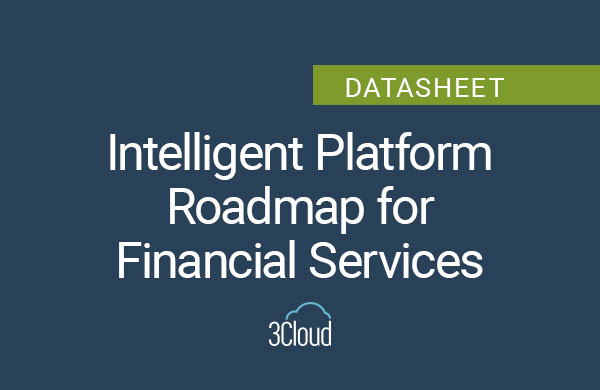 |
Authored By: Charlie Wardell, 3Cloud VP & Field CTO |
One of the most rewarding aspects of my role as Vice President and Field CTO of Data & AI at 3Cloud is the opportunity to help technology and business leadership teams work together to plan their digital business transformation strategies.
Lately, I have been increasingly hearing from IT leaders about their struggles to secure data. This is consistent with recent research indicating 74% of organizations face similar challenges, highlighting the urgent need for accurate data and thoughtful data governance.
As AI moves from the peak of its hype cycle, organizations are beginning to understand that data security, governance and compliance are inextricably linked to the generation of AI models. As regulations progress, organizations will no doubt need to account for the data that is utilized to train or fine tune language models. It is unclear what legislation will be regarding privacy laws and the right to be forgotten and although sensitive information can be mitigated with varying techniques, it cannot be entirely deleted from large language models.
What does this mean for security, privacy, and compliance? If privacy laws enforce the right to be forgotten, will we have to retrain the LLM without that customer’s data? This can have a serious impact on an organization that is not preparing a proper AI strategy. One thing is for certain, we need to not only govern the data that goes into the models, but we need to govern the data along with the models themselves.
Although everyone agrees that high-quality data and strong data governance are crucial for effective AI implementation, getting started can be daunting. Drawing from my latest discussions with executive IT and business leadership teams, here are some practical insights and advice to overcome these challenges.
Improve organizational data quality
Data is the backbone of effective AI systems. Poor data quality leads to inaccurate AI predictions and decisions, which can have significant business implications.
The technology leaders I am working with are prioritizing data quality to ensure that AI systems deliver reliable and actionable insights. They also recognize the importance of fostering a data-centric culture within their organizations.
By prioritizing data quality and governance, organizations can unlock the full potential of their AI initiatives, drive innovation, and start moving out of the AI proof of concept stage and on to significant business growth.
Winning Tactics:
- Conduct regular audits to assess data quality and identify areas for improvement, which helps in maintaining high data standards and ensuring that AI systems are trained on accurate data.
- Establish a single source of truth for your data by pulling information from multiple sources, including on-premises, cloud, and private databases into a modern data platform. Use advanced data integration tools and continuous data improvement processes to maintain high quality and relevance.
- Monitor data quality regularly and implement processes for continuous data improvement so your data remains accurate and relevant.
- Use cutting-edge governance platforms to automate compliance monitoring and manage data privacy and security. Integrated these platforms with AI initiative to ensure real-time adherence to legal and industry standards.
Avoid data sprawl with strong data governance
AI models are only as effective as the quality of their data, underscoring the importance of data quality and governance. Data governance involves clear policies for data management to ensure accuracy, privacy, and compliance. Without it, organizations risk fragmented, inconsistent data, leading to unreliable AI outputs.
Data sprawl is a recurring theme, one client shared an anecdote about an employee who was frustrated with the slow and inadequate reports from the company’s BI system, an employee built his own solution using Excel on his personal computer, based on customer transaction data. Proud of his work, he shared copies of the spreadsheet with colleagues across the organization. This led to uncontrolled data sprawl, making it difficult to ensure data trustworthiness and exposing the company to security risks.
This scenario is a cautionary tale for AI implementation, where unmanaged AI solutions can proliferate rapidly, creating even more complex challenges.
High-quality, well-governed data strategies enhance AI performance and reduce risks of data sprawl enabling organizations to optimize AI investments, reduce risks, and achieve greater value from their technology investments and AI initiatives.
Winning Tactics:
- Create comprehensive data governance policies that outline how data should be collected, stored, and used.
- Implement data access and lineage tracking tools to monitor data access and trace its journey across systems. These tools enhance transparency, detect unauthorized access, and ensure compliance with data protection regulations.
- Utilize tools and technologies that help in maintaining data quality, including data cleansing, validation, and enrichment tools.
Maintain compliance with data privacy regulations
In the United States, several states have enacted comprehensive data privacy laws, and 137 countries worldwide have implemented similar regulations. Enterprises aiming to expand and scale globally require sophisticated approaches to maintain compliance. This need is further intensified for highly regulated industries such as healthcare, life sciences and financial services.
The importance of data governance cannot be overstated, as ungoverned data poses significant risk for compliance with these laws.
Winning Tactics:
- Ensure compliance with privacy laws and manage data subject rights, such as the right to be forgotten, to maintain data security.
- Develop robust data protection strategies, including encryption, access controls, and regular security assessments to safeguard against breaches.
- Implement private AI strategies to protect sensitive data, establish ethical AI use frameworks, and maintain data privacy.
Over my 25-year career in big data and analytics, I’ve never been more convinced of the strategic importance of investing in a unified data platform to minimize data sprawl and drive the enterprise forward to truly capitalize on AI’s potential.
Dedicated investments and a strong commitment to effective data governance practices will be required. Such an investment is pivotal in harnessing the full potential of AI. Achieving this requires dedicated resources and a steadfast commitment to best practices in data governance.
Together, we are not just adapting to the future of AI—we are actively shaping it. By pooling our insights and working collaboratively, we can navigate the complexities, drive transformative innovation, and ensure sustainable growth for our organizations.
|
Charlie Wardell |
With over 30 years of experience in AI & data analytics, Charlie Wardell is a distinguished thought leader and the VP, Field CTO of Data and AI Strategy for 3Cloud Solutions. He spearheads the development of advanced AI and data solutions that drive digital transformation and enhance decision-making in intelligent enterprises.
As a serial entrepreneur, Charlie co-founded companies such as Decooda Inc. (acquired by North Highland) and Digital Cortex, Inc., pioneering technologies that leverage alternative computing to accelerate AI pipelines. Holding multiple patents in AI technologies – including emotion processing systems and text-based knowledge mining – he collaborates with industry giants like Oracle, IBM, Dell, NVIDIA and Microsoft to revolutionize how businesses leverage data and AI for competitive advantage. |




